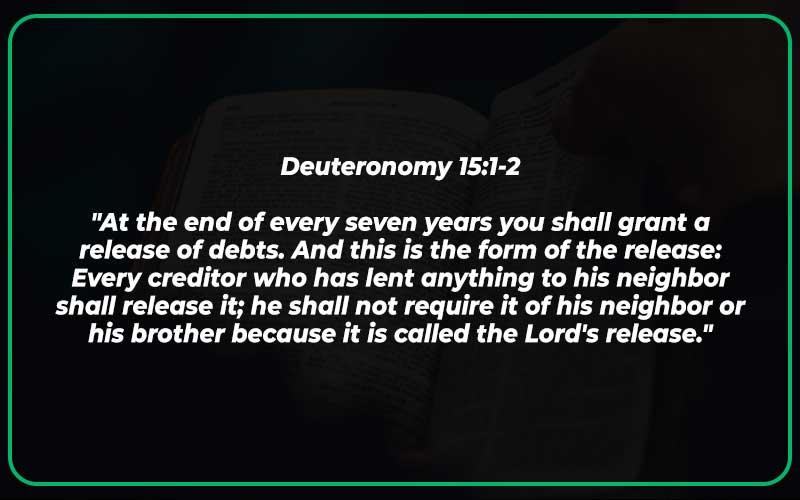The concept of seven years carries symbolic weight throughout the Bible, representing completion, cycles, and divine intervention. Delve into Bible verses about seven years and uncover the deeper meaning behind this number.
Discover how these verses remind us of God’s faithfulness, His plans for our lives, and the importance of trusting in Him through the different seasons and cycles we experience.
Bible Verses About Seven Years
Daniel 9:24
“Seventy weeks are determined for your people and for your holy city.”
In this verse, Daniel receives a prophetic revelation about the future, specifically mentioning a period of “seventy weeks.” This period symbolizes seventy sets of seven years, amounting to a total of 490 years. It reveals God’s plan for His people and the city of Jerusalem.
Genesis 41:29
“Indeed, seven years of great plenty will come throughout all the land of Egypt.”
This verse recounts Pharaoh’s dream, which Joseph interpreted as a prophetic message from God. It foretold a period of abundant harvest and prosperity lasting for seven years in Egypt. This would be followed by a severe famine that God had revealed to Joseph, allowing them to prepare accordingly. The seven years of plenty and famine hold lessons about God’s providence, wisdom, and the importance of proper stewardship.
Leviticus 25:8
“And you shall count seven sabbaths of years for yourself, seven times seven years; and the time of the seven sabbaths of years shall be to you forty-nine years.”
This verse introduces the concept of the Sabbath year, which was to be observed every seventh year. After seven cycles of seven years, amounting to forty-nine years, the fiftieth year was known as the Year of Jubilee. It was a time of rest, release of debts, and restoration of land. The pattern of seven years and the Year of Jubilee serve as a reminder of God’s provision, trust in His faithfulness, and the importance of justice and mercy in society.
Jeremiah 25:11
“And this whole land shall be a desolation and an astonishment, and these nations shall serve the king of Babylon seventy years.”
Jeremiah prophesies about the impending Babylonian captivity of the Israelites. As a consequence of their disobedience, God declared that the land would experience desolation and the nations would serve the king of Babylon for a period of seventy years. This verse emphasizes the importance of obedience to God’s commands and the consequences of turning away from Him.
Genesis 29:27
“Fulfill her week, and we will give you this one also for the service which you will serve with me still another seven years.”
In this narrative, Jacob works for Laban for seven years in order to marry Rachel, the woman he loved. However, Laban deceitfully gives him Leah as his wife instead. Jacob agrees to fulfill the week of marriage with Leah and then works another seven years to finally marry Rachel. This account highlights the theme of patience, perseverance, and the fulfillment of commitments in relationships.

Daniel 4:16
“Let his heart be changed from that of a man, let him be given the heart of a beast, and let seven times pass over him.”
In Nebuchadnezzar’s dream, Daniel interprets the prophecy that the king would be humbled and undergo a period of madness, living like a beast, for “seven times.” This signifies a period of significant duration, indicating the king’s subsequent restoration after acknowledging God’s sovereignty. The verse reminds us of God’s authority and the importance of humility before Him.
Matthew 18:21-22
“Then Peter came to Him and said, ‘Lord, how often shall my brother sin against me, and I forgive him? Up to seven times?’ Jesus said to him, ‘I do not say to you, up to seven times, but up to seventy times seven.'”
In this conversation, Peter seeks clarification about forgiveness, suggesting that forgiving someone seven times would be sufficient. Jesus responds by emphasizing the limitless nature of forgiveness, instructing Peter to forgive not just seven times, but rather seventy times seven. This teaching underlines the importance of extending forgiveness generously and unconditionally, mirroring God’s forgiveness toward us.
1 Samuel 2:5
“Those who were full have hired themselves out for bread, and the hungry have ceased to hunger. Even the barren has borne seven, and she who has many children has become feeble.”
This verse is part of Hannah’s prayer of thanksgiving after God granted her a son, Samuel. It speaks of God’s ability to reverse fortunes and transform lives. The phrase “the barren has borne seven” symbolizes God’s miraculous intervention, turning what was once impossible into a reality. It showcases God’s power to bring about blessings and restoration even in the most challenging circumstances.
Job 42:10
“And the Lord restored Job’s losses when he prayed for his friends. Indeed, the Lord gave Job twice as much as he had before.”
After enduring immense suffering, Job prayed for his friends, and God restored his losses twofold. This verse showcases God’s faithfulness and His ability to redeem and restore even in the face of great trials. It reminds us of the importance of intercession, forgiveness, and the ultimate hope we have in God’s provision.
Ecclesiastes 11:2
“Give a serving to seven, and also to eight, for you do not know what evil will be on the earth.”
In this verse, the author encourages generosity and openness to giving, emphasizing the unpredictable nature of life. The phrase “give a serving to seven, and also to eight” suggests a mindset of abundance and readiness to assist others. It reflects the wisdom of preparing for unforeseen circumstances and demonstrating kindness in a world filled with uncertainties.
Revelation 1:4
“John, to the seven churches which are in Asia: Grace to you and peace from Him who is and who was and who is to come, and from the seven Spirits who are before His throne.”
In the book of Revelation, John addresses a letter to the seven churches in Asia, extending grace and peace to them on behalf of God and the seven Spirits before His throne. This verse highlights the spiritual significance of the number seven and serves as a reminder of God’s presence, authority, and desire for His people to live in unity and faithfulness.
Genesis 8:10-12
“And he waited yet another seven days, and again he sent the dove out from the ark. Then the dove came to him in the evening, and behold, a freshly plucked olive leaf was in her mouth; and Noah knew that the waters had receded from the earth. So he waited yet another seven days and sent out the dove, which did not return again to him anymore.”
After the flood, Noah released a dove from the ark to find dry land. The dove initially returned, but after waiting for another seven days, Noah sent it out again, and it did not return. The presence of the olive leaf indicated the receding of the waters and the restoration of life. This narrative emphasizes patience, trust, and the faithfulness of God’s promises.
Also Read: 28 Bible Verses About Being Intentional (With Commentary)
Matthew 25:1-13
“Then the kingdom of heaven shall be likened to ten virgins who took their lamps and went out to meet the bridegroom. Now five of them were wise, and five were foolish. Those who were foolish took their lamps and took no oil with them, but the wise took oil in their vessels with their lamps.”
This parable tells the story of ten virgins awaiting the arrival of the bridegroom. Five of them were prepared with enough oil for their lamps, while the other five were not. When the bridegroom arrived, only the wise virgins were ready to join the celebration, while the foolish ones were left outside. This parable emphasizes the importance of readiness, preparedness, and the need for spiritual vigilance.
Deuteronomy 15:1-2
“At the end of every seven years you shall grant a release of debts. And this is the form of the release: Every creditor who has lent anything to his neighbor shall release it; he shall not require it of his neighbor or his brother because it is called the Lord’s release.”
In this passage, God commands the Israelites to observe the Year of Release every seventh year. During this time, debts were to be forgiven, releasing people from their financial obligations. It reflects God’s concern for justice, compassion, and the importance of helping those in need. This principle of debt release serves as a reminder of our responsibility to be generous and considerate toward others.

Judges 16:16-19
“And it came to pass, when she pestered him daily with her words and pressed him so that his soul was vexed to death, that he told her all his heart, and said to her, ‘No razor has ever come upon my head, for I have been a Nazirite to God from my mother’s womb. If I am shaven, then my strength will leave me, and I shall become weak and be like any other man.'”
In the story of Samson and Delilah, Delilah persistently pressured Samson to reveal the source of his strength. After much nagging, Samson eventually confessed that his strength resided in his Nazirite vow, which included not cutting his hair. This passage emphasizes the consequences of compromising one’s consecration to God and the importance of honoring our commitments to Him.
Luke 17:3-4
“Take heed to yourselves. If your brother sins against you, rebuke him; and if he repents, forgive him. And if he sins against you seven times in a day, and seven times in a day returns to you, saying, ‘I repent,’ you shall forgive him.”
In this teaching, Jesus emphasizes the necessity of forgiveness and reconciliation within the community of believers. He instructs His disciples to rebuke those who sin against them and to extend forgiveness when genuine repentance is expressed, even if it occurs repeatedly. This teaching highlights the transformative power of forgiveness, the importance of reconciliation, and the demonstration of love in our relationships.
Ruth 4:15
“And may he be to you a restorer of life and a nourisher of your old age; for your daughter-in-law, who loves you, who is better to you than seven sons, has borne him.”
In this verse, the people bless Naomi upon the birth of her grandson, Obed. They pray that he will bring restoration and nourishment to her life, noting that her daughter-in-law, Ruth, has been a faithful and loving companion, surpassing the value of seven sons. This passage highlights the themes of loyalty, redemption, and the blessing of companionship.
Psalm 12:6
“The words of the Lord are pure words, like silver tried in a furnace of earth, purified seven times.”
The psalmist praises the purity and reliability of God’s words, comparing them to refined silver that undergoes seven rounds of purification. This metaphor emphasizes the trustworthiness and integrity of God’s divine revelation. It assures us that His words are flawless, free from impurity, and can be relied upon as a guide for life.
Luke 11:24-26
“When an unclean spirit goes out of a man, he goes through dry places, seeking rest; and finding none, he says, ‘I will return to my house from which I came.’ And when he comes, he finds it swept and put in order. Then he goes and takes with him seven other spirits more wicked than himself, and they enter and dwell there; and the last state of that man is worse than the first.”
Jesus uses this analogy to illustrate the importance of spiritual transformation and the dangers of remaining empty without true repentance and commitment to God. The imagery of an unclean spirit leaving a person and returning with seven other spirits highlights the need for genuine inner change and continuous dependence on God’s power to avoid spiritual vulnerability.
Exodus 22:30
“Likewise, you shall do with your oxen and your sheep. It shall be with its mother seven days; on the eighth day, you shall give it to Me.”
God’s instructions to the Israelites regarding the offering of firstborn livestock include a seven-day period during which the newborn animal was to remain with its mother. On the eighth day, the animal was to be presented as an offering to God. This principle underscores the significance of honoring God with our possessions and recognizing His ownership over all that we have.
Revelation 5:1-7
“And I saw in the right hand of Him who sat on the throne a scroll written inside and on the back, sealed with seven seals.”
In this visionary scene, John witnesses a scroll held by God, sealed with seven seals. The unsealing of the scroll plays a central role in the unfolding of God’s plan for redemption and judgment. The use of the number seven symbolizes completeness, and the opening of each seal signifies a significant event in God’s divine purposes.
Hosea 2:15
“I will give her her vineyards from there, and the Valley of Achor as a door of hope; she shall sing there, as in the days of her youth, as in the day when she came up from the land of Egypt.”
In this verse, God promises restoration to His people, bringing them from a place of judgment and affliction to a door of hope and blessing. The reference to the Valley of Achor recalls a past incident where disobedience led to punishment. This verse showcases God’s grace, mercy, and ability to turn seasons of despair into opportunities for renewal and rejoicing.
Acts 19:14-16
“Also, there were seven sons of Sceva, a Jewish chief priest, who did so. And the evil spirit answered and said, ‘Jesus I know, and Paul I know; but who are you?’ Then the man in whom the evil spirit was leaped on them, overpowered them, and prevailed against them, so that they fled out of that house naked and wounded.”
This account highlights the dangers of attempting to use spiritual power or authority without a genuine relationship with Jesus Christ. The seven sons of Sceva, who lacked a personal connection with Jesus, tried to cast out demons in His name. However, they were confronted by an evil spirit, illustrating the importance of genuine faith and the significance of a personal relationship with Jesus.
Ezekiel 14:21
“For thus says the Lord God: ‘How much more it shall be when I send My four severe judgments on Jerusalem—the sword and famine and wild beasts and pestilence—to cut off man and beast from it?'”
In this verse, God warns about the severity of judgment that will come upon Jerusalem due to the city’s persistent rebellion and idolatry. The four judgments mentioned—sword, famine, wild beasts, and pestilence—represent the devastating consequences of unfaithfulness and serve as a call for repentance and obedience.
Proverbs 24:16
“For a righteous man may fall seven times and rise again, but the wicked shall fall by calamity.”
This proverb contrasts the destiny of the righteous and the wicked. While the righteous may face challenges and stumble, they have the resilience to rise and continue their journey of faith. In contrast, the wicked, marked by their unrighteousness, will eventually face the consequences of their actions. This proverb encourages perseverance, resilience, and the importance of maintaining righteousness despite setbacks.

What does the Bible say About Seven Years?
The number “seven” holds significant symbolic meaning in the Bible. It often represents completeness, perfection, or a divine fulfillment of a promise. One notable instance is the concept of the “Sabbatical Year” in the Old Testament, where every seventh year was designated as a time of rest for the land, allowing it to lie fallow. This practice was outlined in the Book of Leviticus (25:1-7).
Additionally, the idea of a “week of years” is prominent in apocalyptic literature, particularly in the book of Daniel. The prophecy of the seventy weeks in Daniel 9:24-27 has been interpreted in various ways, but it generally signifies a period of intense tribulation followed by a time of divine restoration.
In the New Testament, the book of Revelation employs the number seven extensively, representing completeness and divine intervention. The concept of “seven years” doesn’t appear explicitly, but some interpretations relate it to passages like the seven seals, seven trumpets, and seven bowls which signify God’s ultimate judgment and the eventual establishment of His kingdom.
Overall, the recurrence of the number seven in the Bible is more symbolic than a literal measurement of time. It’s a powerful motif used to convey spiritual truths, divine intervention, and the ultimate fulfillment of God’s plan.

